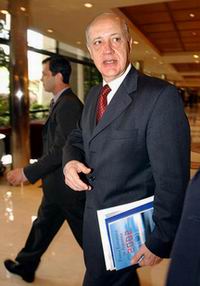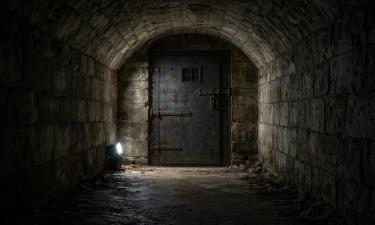Argentina's Economy Minister sacked after dennouncing corruption in public contracts
President Kirchner changed half of his eight-member cabinet
Strenghtened by the stunning victory in October mid-term elections, Argentine President Nestor Kirchner Monday changed half of his eight-member cabinet and sacked the powerful Economy Minister, Roberto Lavagna, who had dennounced corruption in public contracts during a meeting last week. Mr. Lavagna has been replaced by the former head of the state-run Banco de la Nacion, Felisa Miceli, an almost unknown figure who has repeatedly expressed her blind obedience to the president.
Kirchner also replaced Foreign Minister Rafael Bielsa with former deputy minister Jorge Taiana, named Juan Carlos Nadalich as Social Development Minister to replace his sister Alicia Kirchner and a former guerrilla militant, Nilda Garre, to replace Jose Pampuro as his new Minister of Defense. Bielsa, Kirchner and Pampuro won seats in Congress in last month's vote.
In a farewell press conference on Monday afternoon, Lavagna said Kirchner asked him to step down as part of a Cabinet reshuffle following the Oct. 23 legislative elections. "In any serious country, after elections there are adjustments, modifications, changes of this type. The president considered it was a convenient one," he told reporters.
However, there are a number of political moves behind Kirchner's decission to sack his Economy Minister. Lavagna, architect of Argentina's three-year economic recovery following a devastating 2001-02 financial crisis, was widely considered a voice of moderation in Kirchner's government. He was appointed minister during the administration of the then-president, Eduardo Duhalde, Kirchner's former ally and a current political foe of the president.
Kirchner had said during the 2003 presidential race that he did not need an economy minister and that he could be his own. However, as polls showed that Lavagna could boost his aspirations, Kirchner decided to secure his continuity.
The minister had clashed with Kirchner several times since assuming his post in April 2002. A run-in last week with Planning Minister Julio De Vido, a close aide to the president, sparked new tensions and is believed to have led to the rupture.
In a meeting with businessmen in Buenos Aires, Lavagna dennounced corruption in public contracts, coming from De Vido's office. Lavagna said that public works are being ordered to a handful of companies, which rises prices and reduce quality. The issue sparked a strong debate.
Lavagna's remarks came shortly before the leader of the center-left opposition to Kirchner, Elisa Carrio, presented a report on public works prepared by deputies Adrian Perez and Fabiana Rios. The document probes that the handful of companies that control current national public contracts are the same ones that did it in the Province of Santa Cruz – in Argentina's far south- when Kirchner was its governor (1991-2003). The report, available on the internet, also shows that the millonaire budget has been underexecuted. “They built 7 of the 700 schools announced and 46 of the 120.000 living houses planned,” commented Mrs. Carrio during a TV interview on Sunday.
All in all, Monday's cabinet shuffle is an attempt of President Kirchner to gain full control over the economy by sacking all relevant figures in it. Kirchner has now a totally adicted cabinet to rule Argentina as he wishes and will be followed only by close aides, as the controversial De Vido who was strenghtened despite the serious accusations against him.
This year the economy is on track for a third straight year of robust expansion, but economists have forecast 2005 inflation will surpass the government's target of 11 percent. It was not immediately clear how Miceli would tackle inflation or approach the IMF, but analysts believed she would adhere to Kirchner's hard-line stance of rejecting the lender's recommendations to raise utility tariffs, adopt a more flexible foreign exchange policy and negotiate a deal with creditors who rejected its debt swap.
Photo: Good bye Lavagna. This year, the former Economy Minister conducted the succesful debt swap that took Argentina out of the default announced in 2002
Subscribe to Pravda.Ru Telegram channel, Facebook, RSS!





